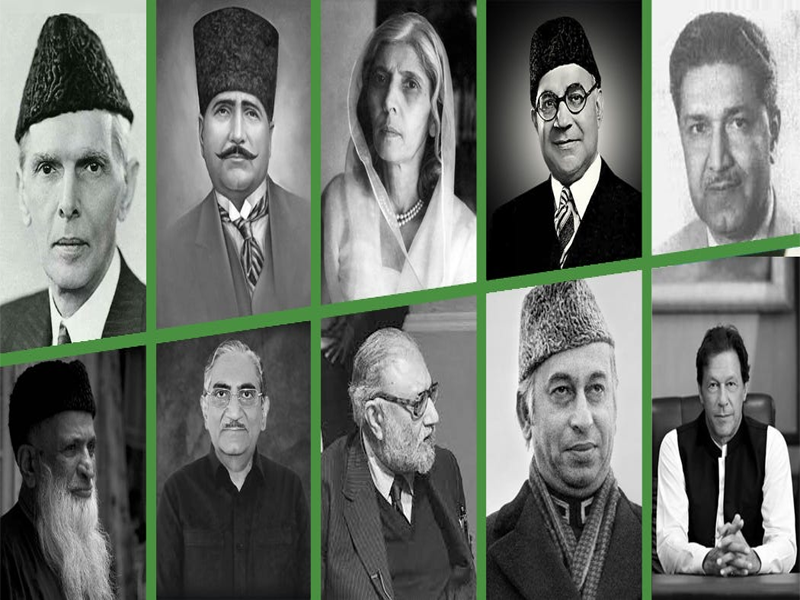National heroes at the time of the creation of Pakistan

- 154
- 0
The creation of Pakistan in 1947 was a momentous event shaped by the efforts and sacrifices of numerous national heroes.
Their vision, leadership, and unwavering commitment played a pivotal role in the birth of this new nation. From political strategists to revolutionary leaders, these figures not only championed the cause of independence but also laid the foundational principles of the nascent state. This article explores some of the most significant heroes who were instrumental in the making of Pakistan. Quaid-e-Azam Muhammad Ali Jinnah, known as the "Father of the Nation," was the principal architect of Pakistan's independence.
His leadership of the All-India Muslim League and his tireless advocacy for a separate homeland for Muslims were crucial in achieving the goal of an independent Pakistan. Jinnah's role as a strategist and orator helped galvanize Muslim opinion across the subcontinent. His insistence on a nation where Muslims could practice their religion freely and manage their affairs without interference was the cornerstone of the Pakistan Movement. Despite facing immense opposition and personal challenges, Jinnah's resolve and political acumen were instrumental in turning the dream of a separate state into reality.Allama Muhammad Iqbal, a philosopher, poet, and politician, was another crucial figure in the creation of Pakistan. His ideas laid the intellectual groundwork for the demand for a separate Muslim state.
Iqbal's vision of a distinct Muslim identity and his advocacy for an independent nation were articulated through his poetry and philosophical works. His famous address at the All-India Muslim League session in 1930 proposed the idea of a separate state, which later evolved into the concept of Pakistan. Iqbal's emphasis on self-determination and his promotion of Islamic values played a significant role in mobilizing support for the cause. Liaquat Ali Khan, a close associate of Jinnah and Pakistan's first Prime Minister, was a key figure during the early days of the country. Liaquat Ali Khan's political acumen and leadership were essential in guiding the newly formed nation through its formative years. His role in drafting the country's initial policies and navigating the complexities of post-independence governance were crucial in stabilizing the fledgling state. Liaquat Ali Khan's dedication to ensuring the survival and success of Pakistan was evident in his efforts to establish a strong governmental framework and his focus on economic and social reforms. Fatima Jinnah, the sister of Quaid-e-Azam Muhammad Ali Jinnah, was a prominent figure in her own right.
A dentist by profession and an active member of the Pakistan Movement, Fatima Jinnah's contributions were significant. She was a vocal advocate for the rights of women and played a key role in rallying support for the independence movement. Her participation in the political landscape and her support for her brother's vision were instrumental in galvanizing women's involvement in the struggle for independence. Syed Ahmed Khan, though his active political role predated the formation of Pakistan, was a significant intellectual influence. His advocacy for Muslim rights and educational reforms laid the groundwork for the emergence of Muslim political consciousness in the subcontinent. Syed Ahmed Khan's efforts to promote modern education and his vision of a Muslim identity in a predominantly British-ruled India contributed to the intellectual foundation that influenced the later demand for a separate Muslim state. Chaudhry Rehmat Ali was another influential figure whose role in the creation of Pakistan is often highlighted. Rehmat Ali is credited with coining the term "Pakistan" and was an ardent advocate for a separate Muslim homeland. His pamphlet "Now or Never" published in 1933, emphasized the need for a separate nation for Muslims and played a role in shaping the narrative around the Pakistan Movement.
Although his influence was more in the ideological realm, his contributions to the nomenclature and concept of Pakistan were significant. Khan Abdul Ghaffar Khan, also known as Bacha Khan, was a prominent leader from the North-West Frontier Province who advocated for the rights of the Pashtun people. Though he initially supported a united India, his later alignment with the idea of an independent Pakistan demonstrated his commitment to the broader cause of independence. Khan Abdul Ghaffar Khan's efforts in mobilizing the Pashtun community and his role in the political landscape were crucial in the broader independence movement. The creation of Pakistan was not just a political achievement but a testament to the collective effort of numerous individuals who dedicated their lives to the cause of independence. These heroes, through their leadership, vision, and sacrifices, played a fundamental role in shaping the future of Pakistan. Their contributions, whether in the realm of politics, intellectual thought, or social reform, were integral in achieving the dream of a separate nation for Muslims of the subcontinent. As Pakistan continues to grow and evolve, the legacies of these national heroes serve as a reminder of the struggle and triumph that marked the birth of the nation.

















































